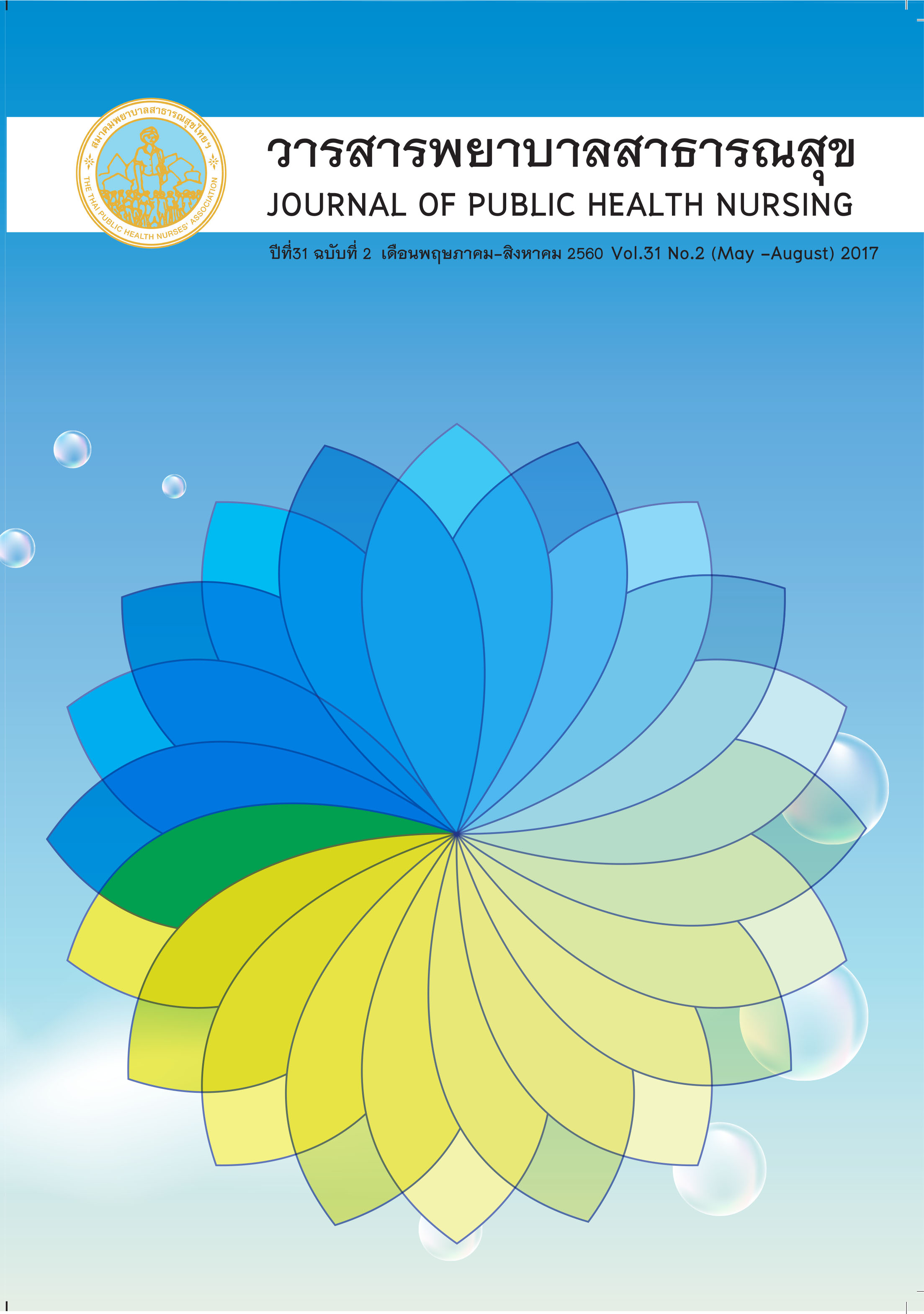ผลของโปรแกรมการจัดการตนเองร่วมกับแรงสนับสนุนทางสังคมในผู้ป่วยเบาหวาน ชนิดที่ 2 รายใหม่ ที่ควบคุมระดับน้ำตาลในเลือดไม่ได้
Keywords:
เบาหวานรายใหม่, การจัดการตนเอง, แรงสนับสนุนทางสังคม, new cases, type 2 diabetes, self-management, social supportAbstract
การส่งเสริมให้ผู้ป่วยเบาหวานรายใหม่ที่ควบคุมระดับน้ำตาลในเลือดไม่ได้ให้มีการจัดการตนเองจะเป็นประโยชน์ในการควบคุมโรค ป้องกันภาวะแทรกซ้อน และส่งเสริมคุณภาพชีวิตที่ดี การวิจัยกึ่งทดลองนี้ มีวัตถุประสงค์เพื่อศึกษาผลของโปรแกรมการจัดการตนเองร่วมกับแรงสนับสนุนทางสังคมในผู้ป่วยเบาหวานชนิดที่ 2 รายใหม่ที่ควบคุมระดับน้ำตาลในเลือดไม่ได้ กลุ่มตัวอย่างคือผู้ป่วยอายุ 30-65 ปี ตรวจรักษาที่คลินิกเบาหวาน แผนกผู้ป่วยนอก โรงพยาบาลอู่ทอง จังหวัดสุพรรณบุรี จำนวน 59 คน จำแนกเป็นกลุ่มทดลองจำนวน 30 คนและกลุ่มเปรียบเทียบจำนวน 29 คน ระยะเวลาศึกษา 9 สัปดาห์ กลุ่มทดลองได้รับโปรแกรมการจัดการตนเองร่วมกับแรงสนับสนุนทางสังคม ประกอบด้วยกิจกรรมการแก้ไขปัญหา การตัดสินใจ การรับรู้แรงสนับสนุนทางสังคม การใช้แหล่งประโยชน์ การสร้างสัมพันธภาพกับบุคลากร การลงมือปฏิบัติ การปรับทักษะการปฏิบัติ การติดตามและกระตุ้นเตือน โดยจัดกิจกรรมในสัปดาห์ที่ 1, 3, 5 ครั้งละ 3 ชั่วโมง ที่คลินิกเบาหวาน สอดคล้องกับระบบนัดของโรงพยาบาล สัปดาห์ที่ 6 โทรศัพท์ติดตามกระตุ้นเตือนโดยผู้วิจัย ใช้ระยะเวลา 5 นาที/ราย หลังจากนั้นประเมินผล สัปดาห์ที่ 7 และติดตามผลสัปดาห์ที่ 9 กลุ่มเปรียบเทียบได้รับเอกสารแผ่นพับความรู้เรื่องโรคเบาหวาน โดยสหวิชาชีพ รวบรวมข้อมูลโดยใช้แบบสอบถามก่อนการทดลอง หลังการทดลอง และระยะติดตามผล วิเคราะห์ข้อมูลโดยใช้สถิติเชิงพรรณนา Chi-square, Repeated measure ANOVA และ Independent t-test
ผลการวิจัยพบว่ากลุ่มทดลองมีคะแนนเฉลี่ยพฤติกรรมการจัดการตนเองเพื่อควบคุมโรคเบาหวาน การรับรู้แรงสนับสนุนทางสังคมจากบุคคลในครอบครัว และค่าระดับน้ำตาลในเลือด (DTX) ดีขึ้นกว่าก่อนทดลองและดีกว่ากลุ่มเปรียบเทียบอย่างมีนัยสำคัญทางสถิติ (p-value < 0.05)
สรุปได้ว่าโปรแกรมการจัดการตนเองร่วมกับแรงสนับสนุนทางสังคมเป็นแนวทางในการดูแลผู้ป่วยเบาหวานรายใหม่ ให้มีศักยภาพในการจัดการตนเองถูกต้องเหมาะสมอย่างยั่งยืน สามารถควบคุมระดับน้ำตาลในเลือดได้ ทั้งนี้สามารถนำโปรแกรมไปประยุกต์ใช้กับผู้ป่วยโรคเรื้อรังกลุ่มอื่นๆได้
The Effect of a Self-Management and Social Support Program for on New Cases with Type 2 Diabetes
New cases of diabetic patients with poorly controlled blood sugar are at risk of severe complications and disability. Enhancing patient’s self-management would be useful in controlling the disease and preventing complications and improving quality of life. This quasi- experimental research aimed to study the effectiveness of a self-management social support programs in new cases of type 2 diabetes who have uncontrolled blood sugar levels. Subjects were type 2 diabetic patients aged 30-65 years receiving diabetes clinic services at the outpatient department, U-Thong Hospital, Suphanburi. Subects were randomly selected and divided into an experimental group (n=30) and a comparison group (n=29). The study took a total of 9 weeks. The experimental group was provided with a self-management and social support program consisting of problem solving, decision making, perceived social support, resource utilization, a patient-health care provider partnership, taking action, self-tailoring, and a follow-up call and encouragement. Activities were arranged 3 times in 3-hour sessions each at the diabetes clinic, U-Thong Hospital according to the appointment system of the hospital. After the 3rd activity, 5 minute telephone follow-up calls were used by the researcher to encourage self-management behavior. Post-test was conducted at the 1st and 3rd weeks after the intervention. The comparison group received brochures about diabetes and routine health education by health care providers. Data were collected using questionnaires during the pre-post experiment and in the follow up stage with analysis using descriptive statistics, chi-square, repeated-measure ANOVA and independent t-test. Results showed that after the intervention, the experimental group had significantly better mean scores of self-management behavior to control blood sugar levels, perceived social support from caregivers, and improved blood sugar levels (DTX) than at pre-experiment and than the comparison group (p-value <0.05) It is suggested that self-management and social support programs may be beneficial for new cases of type 2 diabetes to enhance self-management skills to better control blood sugar levels.
Downloads
Published
How to Cite
Issue
Section
License
บทความที่ตีพิมพ์และแผนภูมิรูปภาพถือเป็นลิขสิทธิ์ของวารสารพยาบาลสาธารณสุข (Thai Public Health Nurses Association)







